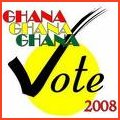Thursday, October 23, 2008
By Alhassan Attah-Quayson
 As Ghana prepares for its general elections on December 7, 2008, it takes good analytical minds to respond to the many promises and comments made by politicians in their bid to win our votes.
As Ghana prepares for its general elections on December 7, 2008, it takes good analytical minds to respond to the many promises and comments made by politicians in their bid to win our votes.
A couple of weeks ago, and indeed on many platforms, the New Patriotic Party’s running mate for the December Elections, Dr. Mahamudu Bawumia, who is also the former Deputy Governor of the Bank of Ghana, said on a campaign trail in the Western Region that the successes chalked by his party is unprecedented in the economic history of the country.
A week later at a press conference he held in Kumasi, he made reference to the ruling party’s extraordinary ability to have grown the economy from a paltry $4 billion in the year 2000, since assuming power, to $16 billion in 2008.
Until last month though, apologists of the ruling government claimed the figure was $3 billion in 2000, which meant Ghana’s per capita income was $150 with a certified population census of twenty million people. Meanwhile World Bank figures and the President’s own speeches indicate the figure was $ 270. That actually puts the size of the economy in the year 2000 at $5.4 billion and not $ 4billion.
I have also wondered how such a suspicious claim compares with the growth rate of the economy over the same period. According to the ruling government, the growth rate of the Ghanaian economy over the past 8 years has averaged seven percent.
For the purposes of argument, even if we assume that the economy has been growing at a rate of ten per cent over the last eight years, this can only move the $4 billion economy as at 2000, to nearly $8.57 billion dollar economy {4(1+0.1)^8}.
This is only half-way the journey! It was, and indeed is, incumbent upon Dr. Bawumia to have explained this huge difference between where he claimed we have gotten to and what our growth rates over the period had been.
Narrowing on the purported average growth rate of 7 per cent over the eight year period puts the size of the economy at $6.87 billion by close of 2008. This is still a significant shortfall from the $16billion economy Dr. Bawumia amazingly extols given his rather prestigious pedigree in economics.
So granted the economy has grown by stretch of Bawumia’s calculations, it is important to note that the successful and peaceful transformation of power from one political party to another, thus from New Democratic Congress to the New Patriotic Party, in the aftermath of December 2000 polls rendered the democratic dispensation in this country with significant credibility.
This development therefore shifted the focus and attention of the international community more on the Ghanaian economy. This meant cancellation of debts, especially when we joined the HIPC initiative, granting of more loans and other sorts of funding (Multilateral Debt Relief Initiative) to the country, and a lot lot more. All these meant that if the government had played its cards well the economy could have grown probably in double digits to commensurate what they are celebrating!
It is significant to also know that rather than the administration growing the Ghanaian economy, it grew its government over the period. The size of the government as a percentage of our gross domestic product which stood at well below 30 per cent is today around 40 per cent. This is unprecedented in the economic history of the country.
It is again unparalleled and probably miraculous than quadrupling the size of the economy while growth rates remain under seven per cent (on average). It is worth noting here that this is radically contrary to conservative ideologies the party was found on and has been preaching around the world.
Fareed Zakaria of Newsweek and CNN has noted that "in a world of competitive capitalism, you need not big government or no government but smart government." But this is certainly not what we are experiencing! The ruling government has been so far away from "smartness" but so large in size that it is engulfed in mismanagement and corruption.
One of the recent reports of the Auditor General noted that half of public funds go waste or is mismanaged! For years, Ghana has attracted significant funds from the international community and, comparatively, little is seen about what these funds have been put to.
The Auditor General’s remark is therefore not surprising. It is important to be mindful of the fact that in the coming years Ghana will have to fight like other performing democracies like Tanzania, Uganda, Malawi, Rwanda and Zambia to attract funds, as the golden era draws close. It is important to reassert our credibility and to investigate what really causes the spending habit of government.
Alhassan Attah-Quayson is a graduate student of the University of Ghana. He writes for www.AfricanLiberty.org


